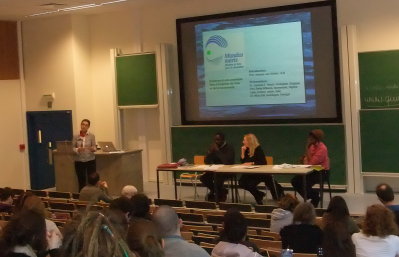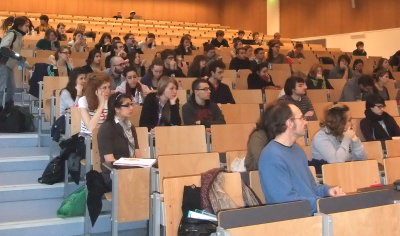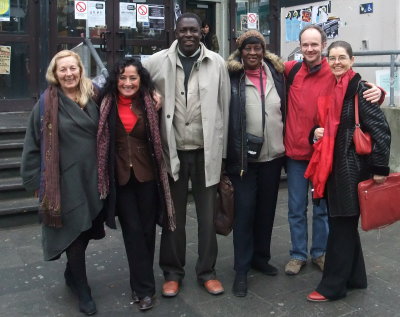Prof. Jacques van Helden briefly introduced the special session of his course leaving the floor to Luz Garcia Ocampo of SEDIF for opening remarks about the history, the objectives and thrust of this year's Programme of Campus Plein Sud.
 The 2011 focus on water is inspired by recently renewed efforts to achieve the recognition of the right to water as a fundamental human right in the context of the United Nations. For the last two weeks of February and March 2011 respectively numerous debates, open courses and other events enable critical reflection and international solidarity activities.
The 2011 focus on water is inspired by recently renewed efforts to achieve the recognition of the right to water as a fundamental human right in the context of the United Nations. For the last two weeks of February and March 2011 respectively numerous debates, open courses and other events enable critical reflection and international solidarity activities.
Cornelia E. Nauen explained that the four members of the Mundus maris team each represented a particular professional perspective and experience. Bringing these together enabled a richer analysis of the current crisis. The goal was to develop a shared understanding and perception to eventually enable more effective action.
She then started the open course proper with a short overview of key parameters of the global water balance and the quantities of water required for the production of different types of food stuffs.
The definition of biological diversity and the predominant pressures leading to extinction rates estimated at 1000 times the historical background completed the overview.
 Stella Williams then connected these to the more than 30 years of her work in rural and artisanal fishing communities in West Africa and the political economy of differentiated access to resources and the particular dependence of the financially poorer parts of the population on functioning ecosystems in the commons.
Stella Williams then connected these to the more than 30 years of her work in rural and artisanal fishing communities in West Africa and the political economy of differentiated access to resources and the particular dependence of the financially poorer parts of the population on functioning ecosystems in the commons.
She noted that even though much research was published the gap from knowledge to action remained large.
Carla Zickfeld picked up the challenge explaining how socially engaged aesthetical operators like herself were able to touch people at a different level. This approach entails multiple use of all types of media for a verification of reality in a participatory and interactive way. She illustrated this with the example of an international cultural project - Civitella d'Agliano - she had led for many years and which had been instrumental in reviving the medieval town centre and its socio-economic life.
 Aliou Sall discussed which approach a socio-anthropologist would chose against social exclusion and for the sustainability of a society. He would also start with the realities of the natural environment and ask how his instruments could become a catalyser for change? From his work in coastal fishing villages along the West African coast he shared how people organise around shared challenges.
Aliou Sall discussed which approach a socio-anthropologist would chose against social exclusion and for the sustainability of a society. He would also start with the realities of the natural environment and ask how his instruments could become a catalyser for change? From his work in coastal fishing villages along the West African coast he shared how people organise around shared challenges.
At the end of an intensive session, several students voiced questions about labelling schemes like the Marine Stewardship Council which entailed costly certification processes often out of reach of small producers in developing countries. Consumers willing to make responsible choices but unsure whether to trust the schemes or not face considerable dilemmas. The discussion went on in smaller groups at the end of the course.
The powerpoint is available here (in French).









